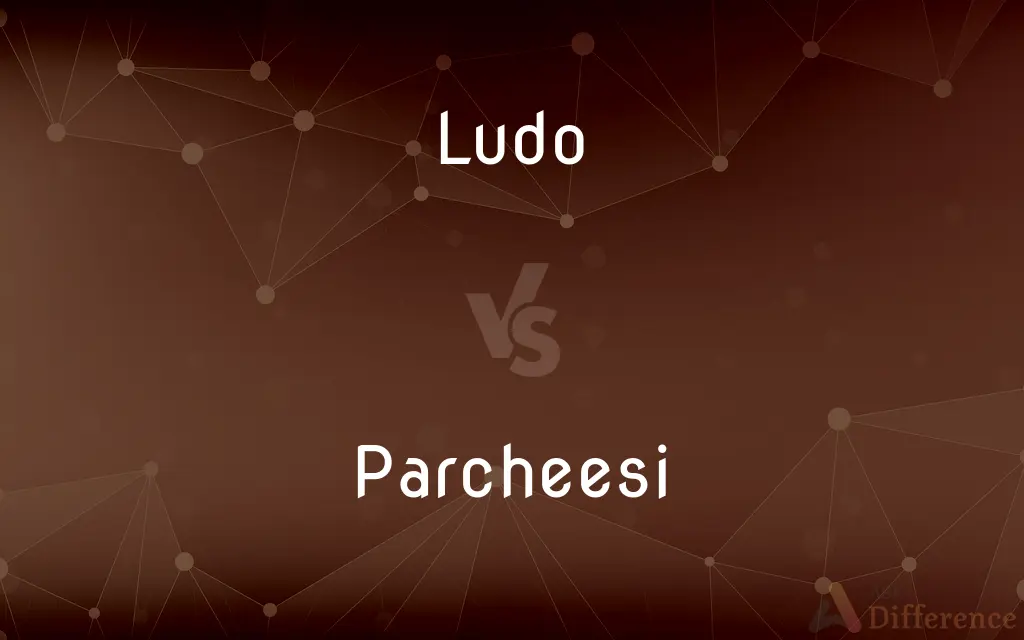Ludo vs. Parcheesi — What's the Difference?
By Tayyaba Rehman & Fiza Rafique — Published on February 2, 2024
Ludo and Parcheesi are both board games derived from the ancient Indian game of Pachisi, but Ludo is simplified and uses a single die, while Parcheesi, an American adaptation, involves more strategy and two dice.

Difference Between Ludo and Parcheesi
Table of Contents
ADVERTISEMENT
Key Differences
Ludo, a simplified version of the ancient game Pachisi, is popular worldwide, especially in European countries. Parcheesi, an American adaptation of Pachisi, incorporates more complex rules and strategies, making it distinct from Ludo.
In Ludo, players use a single die to move their four tokens from start to finish, based on the die's roll. Parcheesi, on the other hand, involves two dice, which introduces a higher level of strategy in terms of movement and token capture.
Ludo boards are typically colorful, with a clear and simple layout that appeals to children and families. Parcheesi boards are often more elaborate, with additional pathways and safe spaces that add complexity to the game.
The objective in both Ludo and Parcheesi is to navigate all of one's tokens around the board and into the home column, but Parcheesi's rules regarding blockades and captures add a layer of strategic depth not found in Ludo.
While Ludo is often seen as a children's game due to its simplicity and reliance on luck, Parcheesi is appreciated by a wider age range for its blend of luck and strategy, reflecting its roots in the more complex game of Pachisi.
ADVERTISEMENT
Comparison Chart
Origin
Simplified from Pachisi
American adaptation of Pachisi
Dice Used
One die
Two dice
Board Design
Simple and colorful
More elaborate with additional paths
Strategy Level
Lower, more reliant on luck
Higher, with more tactical decisions
Objective
Move all four tokens to the home column
Similar, but with more complex rules
Blockades
Not typically part of gameplay
Can create blockades to hinder opponents
Safe Spaces
Fewer and simpler
More, with strategic implications
Appeal
Often considered a children's game
Enjoyed by a wider age range
Gameplay Length
Generally shorter
Can be longer due to strategic play
Compare with Definitions
Ludo
Ludo is a simplified board game derived from the ancient game of Pachisi.
We played Ludo to pass the time during the power outage.
Parcheesi
Parcheesi is an American board game adaptation of the Indian game Pachisi.
Parcheesi is more complex than the version I played as a child.
Ludo
Ludo's gameplay is largely based on luck, depending on the roll of the die.
I was lucky in Ludo last night, rolling several sixes.
Parcheesi
Parcheesi's appeal lies in its blend of luck and strategy, making each game unique.
Every game of Parcheesi is unpredictable, which keeps it exciting.
Ludo
Ludo can be played by two to four players, making it a versatile family game.
Our family of four enjoys playing Ludo on weekend nights.
Parcheesi
Parcheesi is designed for two to four players, offering a challenging and engaging experience.
Parcheesi nights are competitive in our household.
Ludo
Ludo involves moving four tokens around a board based on dice rolls.
I need to roll a six to start my token in Ludo.
Parcheesi
Parcheesi involves strategic movement of tokens around a board, influenced by rolls of two dice.
In Parcheesi, you have to think carefully about each move.
Ludo
Ludo is known for its colorful board and easy-to-understand rules.
The kids love Ludo because of its bright colors and simple gameplay.
Parcheesi
Parcheesi's board features blockades and safe spaces, adding layers of strategy.
Setting up a blockade in Parcheesi can really change the game.
Ludo
Alternative case form of Ludo
Parcheesi
See Pachisi.
Ludo
A simple board game in which players move counters according to the throw of dice
Parcheesi
A modern board game based on pachisi
Common Curiosities
What is Parcheesi?
Parcheesi is an American board game derived from Pachisi, involving strategic token movement around a board based on the roll of two dice.
How do Ludo and Parcheesi differ in terms of dice?
Ludo uses one die, while Parcheesi uses two, affecting the games' complexity and strategy.
What is Ludo?
Ludo is a board game for two to four players, where the objective is to move all four tokens from start to home by rolling a single die.
How do the rules regarding safe spaces differ?
Ludo has fewer and simpler safe spaces, whereas Parcheesi's safe spaces have more strategic implications.
How does the board design differ between Ludo and Parcheesi?
Ludo boards are simpler and more colorful, while Parcheesi boards are more elaborate, with additional pathways and strategic spaces.
Are Ludo and Parcheesi suitable for all ages?
Ludo is often seen as more suitable for children due to its simplicity, whereas Parcheesi is enjoyed by a wider age range because of its strategic depth.
Can you form blockades in both Ludo and Parcheesi?
Blockades are not a typical feature in Ludo, whereas in Parcheesi, players can form blockades to hinder their opponents' progress.
What is the main objective in both Ludo and Parcheesi?
The main objective is to navigate all tokens around the board into the home column, though Parcheesi includes more complex rules.
Which game is more reliant on luck?
Ludo is more reliant on luck due to the single die roll, while Parcheesi requires more strategy due to the use of two dice.
What makes Parcheesi appealing to a wider audience?
Parcheesi's blend of luck and strategy, along with its complex rules, makes it appealing to both children and adults.
Do both games originate from Pachisi?
Yes, both Ludo and Parcheesi are derived from the ancient Indian game Pachisi but have been adapted and simplified in different ways.
How many players can play Ludo and Parcheesi?
Both games can be played by two to four players, making them suitable for small groups or families.
Is strategy more important in Parcheesi than in Ludo?
Yes, strategy plays a more significant role in Parcheesi due to the game's complexity and the use of two dice.
Is Parcheesi longer to play than Ludo?
Parcheesi games can be longer due to the strategic decisions involved, compared to the more luck-based Ludo.
How do the components of luck and strategy compare between the two games?
Ludo is predominantly based on luck due to the single die roll, while Parcheesi offers a balanced mix of luck and strategy, appealing to players who enjoy tactical gameplay.
Share Your Discovery

Previous Comparison
Hasidic Jews vs. Orthodox Jews
Next Comparison
Cold Sore vs. PimpleAuthor Spotlight
Written by
Tayyaba RehmanTayyaba Rehman is a distinguished writer, currently serving as a primary contributor to askdifference.com. As a researcher in semantics and etymology, Tayyaba's passion for the complexity of languages and their distinctions has found a perfect home on the platform. Tayyaba delves into the intricacies of language, distinguishing between commonly confused words and phrases, thereby providing clarity for readers worldwide.
Co-written by
Fiza RafiqueFiza Rafique is a skilled content writer at AskDifference.com, where she meticulously refines and enhances written pieces. Drawing from her vast editorial expertise, Fiza ensures clarity, accuracy, and precision in every article. Passionate about language, she continually seeks to elevate the quality of content for readers worldwide.














































